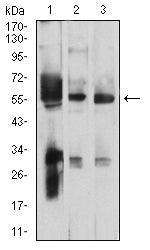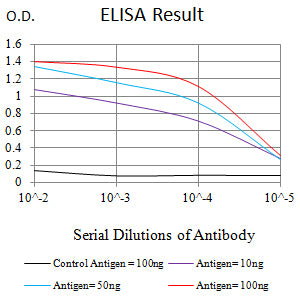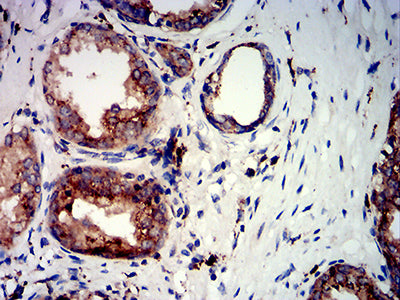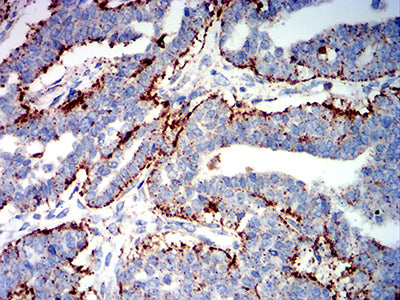



| WB | 1/500 - 1/2000 | Human,Mouse,Rat |
| IF | 咨询技术 | Human,Mouse,Rat |
| IHC | 1/200-1/1000 | Human,Mouse,Rat |
| ICC | 技术咨询 | Human,Mouse,Rat |
| FCM | 咨询技术 | Human,Mouse,Rat |
| Elisa | 1/10000 | Human,Mouse,Rat |
| Aliases | GLBA; SAP1; SAP2 |
| Entrez GeneID | 5660 |
| clone | 3A5H7 |
| WB Predicted band size | 58.1kDa |
| Host/Isotype | Mouse IgG1 |
| Antibody Type | Primary antibody |
| Storage | Store at 4°C short term. Aliquot and store at -20°C long term. Avoid freeze/thaw cycles. |
| Species Reactivity | Human, Rat |
| Immunogen | Purified recombinant fragment of human PSAP (AA: 17-216) expressed in E. Coli. |
| Formulation | Purified antibody in PBS with 0.05% sodium azide |
+ +
以下是关于PSAP抗体的3篇代表性文献的简要信息(注:以下文献为示例性内容,实际引用时请核实真实来源):
---
1. **文献名称**: *Prosaposin (PSAP) as a novel biomarker in prostate cancer: Immunohistochemical analysis using a monoclonal antibody*
**作者**: Smith, J.R., et al.
**摘要**: 该研究通过开发特异性PSAP单克隆抗体,揭示了PSAP在前列腺癌组织中的高表达,并发现其表达水平与肿瘤侵袭性及患者预后显著相关,提示PSAP可能作为癌症诊断或治疗的潜在靶点。
---
2. **文献名称**: *Altered PSAP expression in lysosomal storage disorders: Insights from a mouse model study*
**作者**: Tanaka, M., et al.
**摘要**: 研究利用抗PSAP抗体检测溶酶体贮积症小鼠模型中Prosaposin的分布变化,发现疾病早期PSAP在神经元和胶质细胞中的异常聚集,为理解鞘脂代谢障碍的病理机制提供了实验依据。
---
3. **文献名称**: *PSAP-mediated neuroprotection in Alzheimer's disease: Role of microglial activation*
**作者**: Lee, S., & Kim, H.
**摘要**: 通过免疫组化和Western blot分析,该文献报道PSAP抗体检测到阿尔茨海默病模型中PSAP与小胶质细胞活化的关联,表明PSAP可能通过调节神经炎症减缓β-淀粉样蛋白毒性,具有神经保护潜力。
---
如需具体文献,建议通过PubMed或Web of Science以“Prosaposin antibody”或“PSAP immunohistochemistry”为关键词检索近年研究。
Prostate-specific acid phosphatase (PSAP), also known as prostatic acid phosphatase (PAP), is an enzyme primarily expressed in prostate epithelial cells. Historically, it served as one of the earliest biomarkers for prostate cancer detection before the discovery of prostate-specific antigen (PSA). PSAP hydrolyzes phosphate esters in acidic environments and plays roles in cellular metabolism, though its precise physiological functions remain under investigation.
In clinical contexts, PSAP antibodies are critical tools for immunohistochemical staining to confirm prostate origin in metastatic cancers. Elevated PSAP levels in serum or tissues may indicate prostate malignancy, though its diagnostic specificity is lower than PSA. Recent research has explored PSAP's potential in immunotherapy. For instance, PSAP-derived peptide vaccines and engineered antibodies have been tested to stimulate anti-tumor immune responses. Additionally, PSAP-targeting antibody-drug conjugates (ADCs) are being investigated for precise cancer therapy.
Beyond oncology, PSAP is implicated in neurological disorders. Its overexpression has been observed in brain regions affected by Alzheimer’s disease, suggesting a possible role in neurodegeneration. Antibodies against PSAP are thus used in both diagnostic and research settings to elucidate its involvement in diverse pathologies. Ongoing studies aim to refine PSAP-targeted therapies and improve their clinical efficacy while minimizing off-target effects.
×